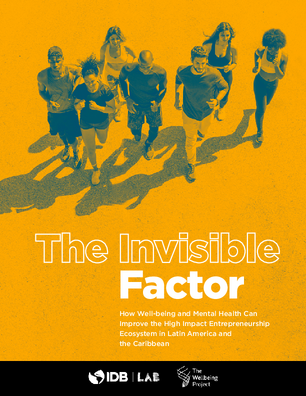The Invisible Factor: How Well-being and Mental Health Can Improve the High Impact Entrepreneurship Ecosystem in Latin America and the Caribbean
Date
Jun 2023
All across the high-impact entrepreneurship and innovation ecosystem in Latin America and the Caribbean (LAC), entrepreneurs are sharing stories about how difficult it is to successfully maintain and grow their enterprises every day. The daily pressure they feel is commonly associated with factors that are easy to see and measure, such as finances, operations, and those related to sustainability and scalability. However, there isnt much we can know about the impact and possible consequences of such pressure on the personal sphere, such as the daily life of the human beings behind every enterprise and their families. Its an invisible factor. The time has come, though, to make it visible.
High-impact enterprises are an essential part of our countries dynamic economies. However, in many cases the entrepreneurs behind them face circumstances and challenges that are very particular to the region. Besides everyday financial and operational pressure, they must navigate constantly changing political, economic, and social contexts, as well as in more recent times: the massive impact of the COVID-19 pandemic. This caused an environment of high uncertainty and tension, where entrepreneurs struggle to maintain and grow their initiatives while maintaining their commitments to their workforce. The fact that this personal challenge looks often invisible, and tends to be faced in solitude because of prejudice or stigmatization, makes the HIEE sector “more prone to suffer from well-being and mental health alterations, such as anxiety, fatigue, depression or burnout syndrome, compared to the population in general” (Endeavor, 2020).
In order to understand and make visible the situation of well-being and mental health, specifically in the regions HIEE, this research performed an exploratory study to identify and interview a diverse group of entrepreneurs in several LAC countries. They are founders or collaborators, of different genders and industries, involved in enterprises at different stages and varying market and geographical reach, who volunteered to share their experiences and opinions. Based on this exploration, which focused on analyzing the current situation of the participants, we believe it is possible to project what is potentially affecting a larger part of the ecosystem. This can help bring visibility to the importance of addressing well-being and mental health issues among entrepreneurs, but also among those who incubate them, accelerate them, or invest in them. Helping to potentiate these good practices, funding research, and offering programs or tools to provide specialized assistance to the regions entrepreneurship ecosystem, will be fundamental. Given the moment the region is having, and in order to strengthen the ecosystems growth, we need a new strategic focus: if the entrepreneurs are healthy, the enterprises will perform better.
High-impact enterprises are an essential part of our countries dynamic economies. However, in many cases the entrepreneurs behind them face circumstances and challenges that are very particular to the region. Besides everyday financial and operational pressure, they must navigate constantly changing political, economic, and social contexts, as well as in more recent times: the massive impact of the COVID-19 pandemic. This caused an environment of high uncertainty and tension, where entrepreneurs struggle to maintain and grow their initiatives while maintaining their commitments to their workforce. The fact that this personal challenge looks often invisible, and tends to be faced in solitude because of prejudice or stigmatization, makes the HIEE sector “more prone to suffer from well-being and mental health alterations, such as anxiety, fatigue, depression or burnout syndrome, compared to the population in general” (Endeavor, 2020).
In order to understand and make visible the situation of well-being and mental health, specifically in the regions HIEE, this research performed an exploratory study to identify and interview a diverse group of entrepreneurs in several LAC countries. They are founders or collaborators, of different genders and industries, involved in enterprises at different stages and varying market and geographical reach, who volunteered to share their experiences and opinions. Based on this exploration, which focused on analyzing the current situation of the participants, we believe it is possible to project what is potentially affecting a larger part of the ecosystem. This can help bring visibility to the importance of addressing well-being and mental health issues among entrepreneurs, but also among those who incubate them, accelerate them, or invest in them. Helping to potentiate these good practices, funding research, and offering programs or tools to provide specialized assistance to the regions entrepreneurship ecosystem, will be fundamental. Given the moment the region is having, and in order to strengthen the ecosystems growth, we need a new strategic focus: if the entrepreneurs are healthy, the enterprises will perform better.




